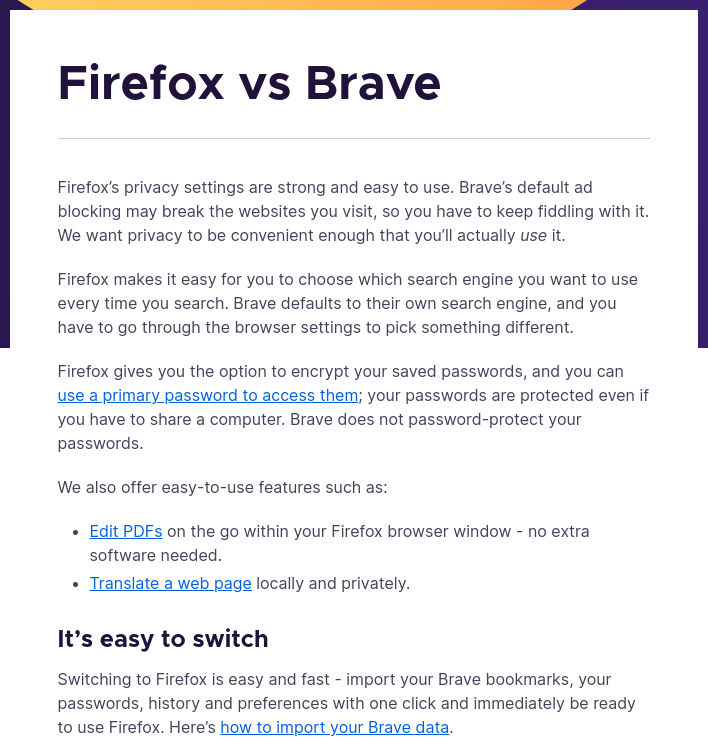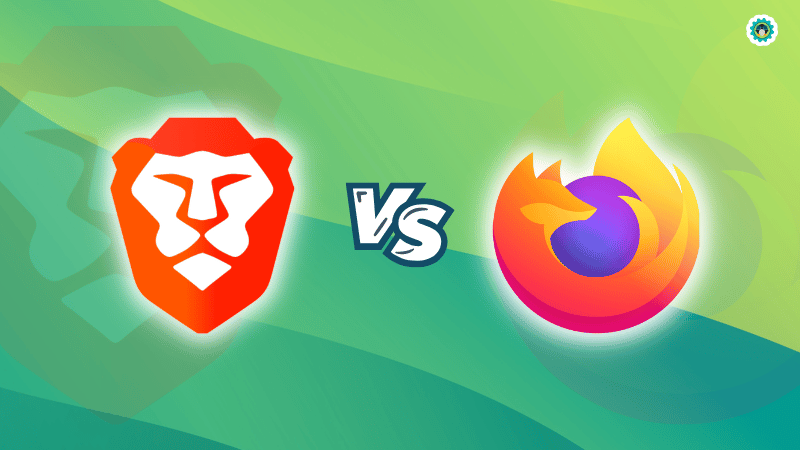I Tried Proton's Lumo AI, a Private Alternative to ChatGPT
Tired of ChatGPT Tracking You? Proton is now offering an end-to-end encrypted AI chats with no data logging or tracking. Here's my experience with it.
Firefox put out some claims on their blog post, but it is not exactly how it seems. Do you agree?


Web browsers are synonymous with the internet, as they serve as a user-friendly means to interact with the online world. Users who care about their privacy usually switch to options like LibreWolf, Brave, Firefox, and Mullvad Browser.
At the same time, the debate over Brave vs. Firefox is a longstanding one, and now it appears that the conversation has taken a rather spicy turn following Firefox's post on Brave.
Let's see what's happening. 😳
This is some severe mental gymnastics from charlatans at the Firefox propaganda dept with this one.
— LukΞ Mulks 🦁⟁◎⟁ (@lukemulks) October 30, 2024
Let's unpack this nonsense.
🧵https://t.co/zdLtpgtKrP pic.twitter.com/N1kyWvzuCj
Debunking Firefox's claims that Brave was an ill-equipped browser, Luke Mulks, VP of Business Operations at Brave Software, took to X (formerly Twitter) to share that it was not the case.
He started by showing off the most recent PrivacyTests stats, where Firefox performed worse than Brave on the privacy front. This was in response to the claim that “Firefox's privacy settings are strong and easy to use.”
He then moved on to Firefox's claim that Brave's default ad-blocker may break websites and that you have to “keep fiddling with it”. Luke added that their ad blocking is being continuously improved, and can be toggled off per site.

Similarly, the statement about Brave defaulting to their search engine and users needing to go into the browser settings also caught flak.
Luke pointed out that Mozilla itself takes money from Google for keeping it as the default search engine on Firefox, and that this behavior with Brave Search was a feature, not a bug.
He also further clarified that there is a dedicated “Find elsewhere” button on Brave, which allows users to use Google, Bing, and Mojeek to search for things.
Closing out his arguments against Firefox, Luke noted that even though Brave is a Chromium-based web browser, their team ensures to “harden the hell out of it”.
He said that open source software like Chromium is beautiful in a way that it allows building applications on user-first principles, allowing developers to “correct user-hostile business ethics corruption at scale”.
💬 What are your views on this? Should Firefox up their game instead of doing just PR?
Suggested Read 📖

Stay updated with relevant Linux news, discover new open source apps, follow distro releases and read opinions
Ran into some small problems so looked for an alternative.
I like Floorp and especially Zen, both allow me to set Freespoke as my default search engine.
Not sure I could go back to a browser that doesn't have workspaces.
When this happens I try to use Firefox on an old "sanitary" laptop, transferring the results locally - offline.
I use Edge on occasion as I find that co-pilot is better than LEO.
I've never tried Brave.
Ernie
Also ublock works best in Firefox. This is what the developer of Firefox suggests to use.
For more information
https://github.com/gorhill/uBlock/wiki/uBlock-Origin-works-best-on-Firefox
For anyone thinking about jumping ship, you can easily disable all the crypto wallet and Web3 features by searching for them in "brave://flags". Granted they shouldn't be enabled in the first place, but it's easy to toggle off at least.
As for ad blocking, uBlock MV2 will supported long term and can be found in Brave's settings. I'd recommend leaving Brave shields enabled with strict blocking, but deselect any block lists to avoid conflicts with uBlock's own.
Stop lying obama.
You said to deselect any block list to avoid conflicts with ublocks own????? you make no sense. ublock origin is built directly into brave and there is no reason people must undo the defaults and it is ok to select more block list if needed. you also said you can disable items with brave://flags when there is no reason for most people to be messing with that when they can just toggle all that stuff on and off in settings which is safer and easier for people who may not understand all the flags.
Also the recent ruling against Google Search default will have a massive impact on Mozilla https://fortune.com/2024/08/05/mozilla-firefox-biggest-potential-loser-google-antitrust-search-ruling/
The search deal was renewed for another three years in 2022, with Mozilla expected to generate over $400 million annually from Google.
Opera was purchased for $600 million in 2016.
It's Mozilla's releases that are bad and come with user-hostile defaults in need of constant tweaking. Distros should stop shipping mozilla's builds and default to a derivative like floorp or librewolf (this one's difficult since its defaults are actually overreaching).
First of all there is no fork of ublock built in brave.
brave shields is less powerful than ublock, it doesn't support $popup and they leach ublock filters.
It also whitellists ads from brave inc ad platform.
ublock is more powerful than anything and the full power of it is unleased in firefox based browsers only.
For more information
https://github.com/gorhill/uBlock/wiki/uBlock-Origin-works-best-on-Firefox
Key Features
uBlock Origin compatibility: ablock-rust maintains compatibility with uBlock Origin’s resource formats, enabling the use of existing filters and rules.
Scriptlet injection and redirect rules: ablock-rust supports scriptlet injection and redirect rules, similar to uBlock Origin.
Content-blocking feature: enables conversion of standard ABP-style rules into Apple’s content-blocking format, supporting export for iOS and macOS platforms.
Resource-assembler feature: parses resources directly from file formats used by the uBlock Origin repository.
Benefits
Native integration: ablock-rust is a native Rust-based engine, allowing for tighter integration with the Brave browser and improved performance.
Open-source: the rewritten engine is open-source, enabling community contributions and transparency.
Decoupling from JavaScript: Brave’s adblocker is no longer reliant on browser extensions, reducing potential security risks and improving overall browser stability.
Conclusion
Brave’s decision to fork uBlock Origin and rewrite its engine in Rust has resulted in a powerful, native adblocker engine, ablock-rust. This move enables Brave to maintain control over its adblocking capabilities, improve performance, and provide a more secure and transparent experience for users.
that's why mozilla bought an ad platform. like the one brave has.
privacytests org is also run by their employees.
finally firefox is waking up and respond to their nonsense.